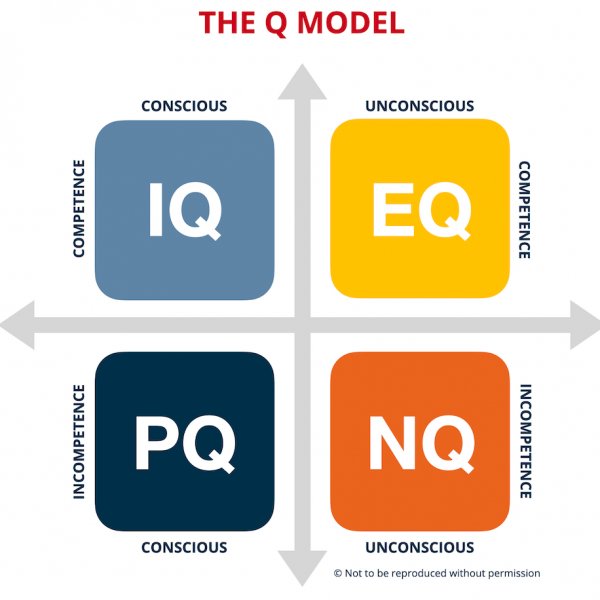What we see when we look at people, are the overt, visible aspects of behaviour: their actions, dress, language etc. But under the surface are other elements that we need to understand - the elements that influence how people behave, the way they do things and how they work. As we shall see, understanding the hidden aspects- attitudes, beliefs and personality-helps us understand ourselves and others, and enable our communication to be more inclusive.
The Q Model: Women’s Unconscious Bias
The Talent Quotient (Q Model), developed by Jenny Morris, explains those factors that influence behaviour as people strive to achieve their career aspirations. It describes four behavioural states:
- Conscious competence or IQ (Intelligence Quotient)
- Unconscious competence or EQ (Emotional Quotient)
- Conscious incompetence or PQ (Personal Quotient)
- Unconscious incompetence or NQ (No Clue!)

While the model can be applied to any minority group –different cultures, lateral hires, graduates – it is especially relevant to women as is demonstrated in the following analysis of the conscious and unconscious competencies of women in management. It explains why women fail to progress up the corporate ladder at the same rate as their male counterparts.
Please note these are generalisations and the basis for building a personal dashboard. It will not apply to all women equally. The challenge is to identify one’s own personal bias’s and
1. Conscious Competence or IQ
Women are consciously competent at IQ (i.e. their technical ability to get the job done). IQ competencies include achieving outputs, results, multi-tasking, performance and technical skills. In the first half of a career IQ gets you noticed and promoted. If you work hard, you’ll be rewarded.
2. Unconscious Competence or EQ
Women are unconsciously competent at their EQ (how to get the job done). EQ qualities include the ability to build and nurture relationships, collaborate, innovate, manage stakeholders, and ensure ethical decision-making. These are all highly valued leadership capabilities and competencies in men, but women don’t recognise, validate, or value them in themselves. Instead, women take these qualities for granted because that’s ‘just who we are’.
3. Conscious Incompetence or PQ
Women are consciously incompetent when it comes to PQ (personal brand). Women acknowledge that they often lack skills at networking, managing their work/life balance, conflict resolution, assertiveness, professional development, taking care of their own wellbeing. Yet they don’t allocate sufficient time for themselves as they are often too busy in the IQ box.
4. Unconscious Incompetence or NoQ
The NoQ (no clue) area is the area tied up with’ playing the game’, lobbying, promoting yourself, increasing your personal and professional profile, exerting power/influence, asking for what you want, negotiating for yourself. The need to address the NoQ’s acknowledges that after middle management the game has changed. Success is no longer about IQ….it is about NoQ. Not realising the game has changed, women often fail to develop a new game plan.
Women in Australia have a strong resistance to the NoQ qualities, describing them as showy, egotistical and lacking in depth. In fact, women who display NoQ behaviours are often criticised by both men and women colleagues as being too pushy and ambitious! The challenge is to identify one’s individual and authentic leadership style to ensure women have a voice and it is heard.
